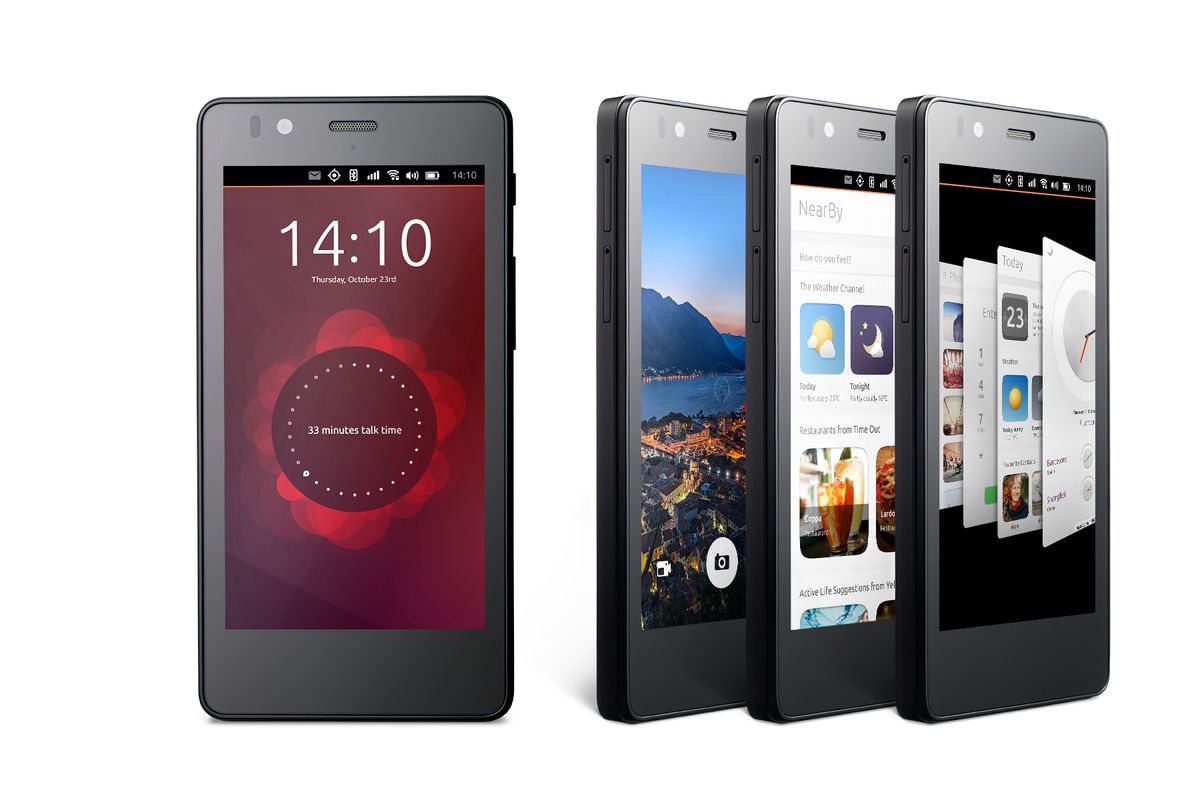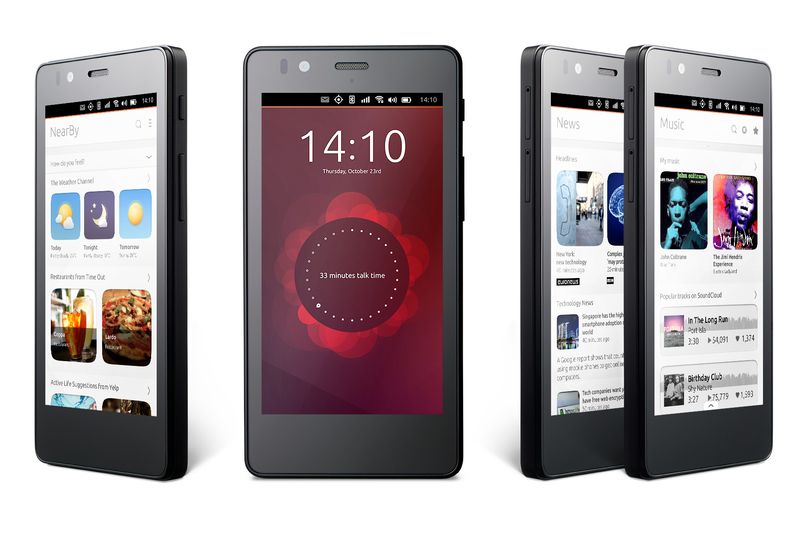First Ubuntu Smartphone To Focus On 'Scopes' Rather Than Apps
Canonical, the British company developing the Ubuntu Linux distro, announced the first commercially available Ubuntu phone, which will launch on February 9. The Aquaris E4.5 Ubuntu Edition will be available across Europe from BQ.com, BQ Mobile's website. BQ Mobile will be Canonical's first OEM partner in developing Ubuntu phones.
Although the phone will be available for purchase three days from now, there is one catch: the company will only hold "flash sales" for now, which is a method of gauging interest for a new product as well as creating buzz around it through scarcity that's been perfected by Asian OEMs such as Xiaomi.
Canonical believes that for a new entrant in the mobile operating system market such as Ubuntu, this model of sales makes more sense because only a small number of core fans may be interested in it initially. Therefore, it doesn't pay to order millions of them from the supply chain right now. As the core fans get their hands on the Ubuntu phones, Canonical hopes they'll love them and then spread the word about it, in order to get other customers interested in the next wave of flash sales.
Entering the mobile market with a new operating system post-2010 (when Android was embraced by all major phone manufacturers) isn't easy, and both Microsoft (with its Windows Phone OS) and Samsung (with Tizen) can attest to that. Consumers want apps, but most developers can hardly support two main mobile platforms, let alone three or four.
Canonical has believed from the beginning that adding compatibility for Android apps wouldn't work either, as the Ubuntu OS would just become redundant. In other words, why use Ubuntu with (some) Android apps when you can just use Android?
Canonical decided to try and "bypass" the app discussion by focusing on "Scopes." A scope is essentially a full-screen "card" (as in Google Now cards) or a "hub" that's focused on a category of services.
“Ubuntu presents users with an entirely different way to engage with their devices – Scopes guide you to content you want – in the same way you think about it – to deliver a smooth, engaging experience," said Cristian Parrino, VP Mobile at Canonical. “For developers, Scopes are a much simpler and more valuable way to build mobile experiences than apps – significantly changing ecosystem dynamics."
Get Tom's Hardware's best news and in-depth reviews, straight to your inbox.
The main home screen is called the Today scope and presents the user with multiple options based on his or her most frequent actions. It includes the local weather, latest news, Twitter trends, and most commonly-contacted friends.
When swiping to the right, owners can access other default Scopes such as Music, Video, Photos, "Nearby" and Apps.
The Music Scope can show music from multiple streaming services, and it can also track concerts through Songkick. The Video scope shows clips from YouTube or other video services. The Photos Scope lists pictures from the local storage or from the cloud from services such as Facebook, Picasa or Flickr. The Nearby Scope presents data relevant to your current location such as the traffic conditions, transportation options or the available restaurants in the area.
The Apps Scope provides a list with all the other native (QML code) or HTML5 applications that are installed on the phone.
Ubuntu smartphone owners can also customize their default Scopes with different services, or they can create new Scope cards from scratch.
The idea behind Scopes seems to be to offer smartphone owners access to the most popular functionality they'd require from their phones, without having to go into separate apps. This approach has its benefits for people who don't want to tinker with their phones and just want to use them as they are out of the box. However, it also has the disadvantage of being much more limited in terms of functionality that other platforms get from third-party apps.
Another reason why Canonical is so focused on services rather than apps is because it intends to make money by partnering with the services from their default Scopes. Canonical has already done something similar with the desktop version of Ubuntu, where it partnered with Amazon to show Ubuntu users Amazon results in their local searches. This approach has been highly successful for Xiaomi, as well.
The Aquaris E4.5 Ubuntu Edition comes with a 4.5" screen, 960 x 540 resolution, quad-core 1.3 GHz Cortex A7 CPU from Mediatek, 1 GB of RAM, 8 GB of storage, microSD support, 8MP rear camera with dual flash and 1080p video, 5MP front-camera, and dual-SIM support.
The device will cost 170 euro, and given its specs, it should compete with devices such as the Moto G or LG G2 Mini. Going after the mid-range market doesn't seem like something that Canonical planned, at least not in the same way that Mozilla planned to go after the ultra-low-end market with Firefox OS.
Instead, it looks like Canonical is trying to bring Ubuntu to the mobile market in any way it can, and BQ Mobile was one of the few OEMs to offer its support. In the spirit of competition, hopefully Canonical finds more OEMs that want to put the company's OS on their phones, but that will depend on how well received the Aquaris E4.5 will be.
Follow us @tomshardware, on Facebook and on Google+.
Lucian Armasu is a Contributing Writer for Tom's Hardware US. He covers software news and the issues surrounding privacy and security.
-
Pete7890 No one is going to buy this. When I last read about the Ubuntu smartphone, it was supposed to be about bridging the gap between Ubuntu desktop and mobile platforms. Why am I now reading that this product has deteriorated, according to painfully clichéd advertising drivel ("engaging experience"?!) that this platform is now basically a smartphone Jitterbug? I would be humiliated to work for Ubuntu and release a product that matches the description in this article.Reply -
rluker5 Maybe they just didn't show the desktop. the rest of it looks pretty polished for Ubuntu. someone typing sudo stuff in terminal in some exotic location would look scary for people not into Linux.Reply
other than that, they already have scopes but on my windows phone they're app folders and i'm sure the larger os's have them too. it would be neat to switch desktops like Ubuntu though. or be able to do more desktop stuff. I hope it's there somewhere.
but personally, I stopped using Linux when windows 8 came out. all of my os related issues, even with the older computers I checked, were gone! -
randomizer ReplyWhen I last read about the Ubuntu smartphone, it was supposed to be about bridging the gap between Ubuntu desktop and mobile platforms.
Are you referring to the Ubuntu Edge? If so, that was targeted to another market. That thing was a developer-oriented device that would have been used as a playground for Canonical's "convergence" ideas. It didn't get enough support. Unfortunately for Canonical, the "convergence" idea is no longer new, and they've probably missed the boat again. Maybe they gave up on the software side for that too and that's why we have this scopes idea, but I think Mozilla is already doing something similar in Firefox OS. -
ToastJ Sure, it's got low end specs. Sure, it's cheap. But it's Ubuntu. I fully support all Linux distros, but this is probably my favorite. Hopefully this product won't be lost, it's got potential.Reply -
"make money by partnering with the services from their default Scopes"Reply
That's exactly why I and millions of people dumped Ubuntu. Who wants to be bombarded with advertisements every time you look for an app? -
skopski if ubuntu make no bloatware NO mallware no marketing popUPs in app policy they or someone else who wil make this (and someone will) want to compete with the others i think winnig formula is give people simple os no unnwanted apps no popups and you have a winnerReply
70 % from people i now will join You desparate people CLEAN Software you win or you change the world of Smart?phones stop annoying spying software you win -
sea monkey An app that can access multiple services is still an app. It doesn't need a new name.Reply


